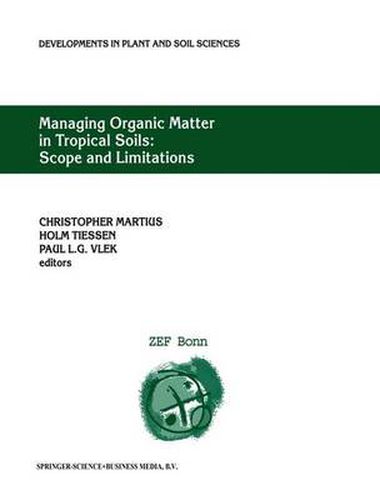Readings Newsletter
Become a Readings Member to make your shopping experience even easier.
Sign in or sign up for free!
You’re not far away from qualifying for FREE standard shipping within Australia
You’ve qualified for FREE standard shipping within Australia
The cart is loading…






This title is printed to order. This book may have been self-published. If so, we cannot guarantee the quality of the content. In the main most books will have gone through the editing process however some may not. We therefore suggest that you be aware of this before ordering this book. If in doubt check either the author or publisher’s details as we are unable to accept any returns unless they are faulty. Please contact us if you have any questions.
Soil organic matter is a reservoir for plant nutrients, it provides water-holding capacity, stabilizes soil structure against compaction and erosion, and thus determines soil productivity. All agriculture to some degree depends on soil organic matter. It has long been known that soil organic matter declines when land is taken into cultivation, and that the productivity of new agricultural land is governed by fertility contributions from decomposing natural organic matter. The expansion of agriculture to ever new and more fragile lands, particularly in tropical and developing regions, causes environmental degradation with local effects on soil quality, regional effects on landscape integrity and water quality, and global effects on carbon cycles and the atmosphere. Rates of soil organic matter loss, equilibrium levels under different land use, and management options for stabilizing or reversing losses have been documented for temperate ecosystems. This has provided options not only for improved fertility management and lowered inputs but also for mitigation of greenhouse gas emissions. The understanding of processes governing organic matter in the tropics is documented in this book, and critical gaps in knowledge and management are explored for a readership of resource scientists, economists and advanced students.
$9.00 standard shipping within Australia
FREE standard shipping within Australia for orders over $100.00
Express & International shipping calculated at checkout
This title is printed to order. This book may have been self-published. If so, we cannot guarantee the quality of the content. In the main most books will have gone through the editing process however some may not. We therefore suggest that you be aware of this before ordering this book. If in doubt check either the author or publisher’s details as we are unable to accept any returns unless they are faulty. Please contact us if you have any questions.
Soil organic matter is a reservoir for plant nutrients, it provides water-holding capacity, stabilizes soil structure against compaction and erosion, and thus determines soil productivity. All agriculture to some degree depends on soil organic matter. It has long been known that soil organic matter declines when land is taken into cultivation, and that the productivity of new agricultural land is governed by fertility contributions from decomposing natural organic matter. The expansion of agriculture to ever new and more fragile lands, particularly in tropical and developing regions, causes environmental degradation with local effects on soil quality, regional effects on landscape integrity and water quality, and global effects on carbon cycles and the atmosphere. Rates of soil organic matter loss, equilibrium levels under different land use, and management options for stabilizing or reversing losses have been documented for temperate ecosystems. This has provided options not only for improved fertility management and lowered inputs but also for mitigation of greenhouse gas emissions. The understanding of processes governing organic matter in the tropics is documented in this book, and critical gaps in knowledge and management are explored for a readership of resource scientists, economists and advanced students.